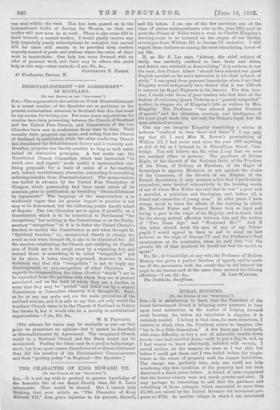DISESTABLISHMENT " BY AGREEMENT" IN SCOTLAND.
[TO THE EDITOR OF TEE "SPECTATOR."] Sin,—The arguments in the article on Welsh Disestablishment in a recent number of the Spectator are so pertinent to the present ecclesiastical situation in Scotland that this fact must be my excuse for writing you. For some years negotiations for reunion have been proceeding between the Church of Scotland and the United Free Church, and Committees of the two Churches have met in conference from time to time. Until recently little progress was made, and seeing that the Church of Scotland is established, while the other conferring Church has abandoned the Establishment theory and is violently anti- Erastian, progress was hardly possible so long as each main- tained its distinctive principles. A. few weeks ago the Established Church Committee, which was instructed " to watch over and report," made public a memorandum out- lining proposals for a basis of union of a far-reaching and, indeed, revolutionary character, amounting to something indistinguishable from Disestablishment. The memorandum was bailed in advance by the United Free Presbytery of Glasgow, which presumably had been made aware of its contents prior to publication, as heralding "Disestablishment by Agreement." The language of the memorandum is so studiously vague that its precise import in practice is not easy to be determined, but the following points hardly admit of dispute. The two Churches are to agree, if possible, on a Constitution which is to be submitted to Parliament "for recognition," but nothing in the Constitution or in the Parlia- mentary " recognition" of it is to fetter the United Church's freedom to modify the Constitution as and when thought fit. "Spiritual freedom," i.e., unrestricted liberty to change the creed as and when thought fit, is also to be stipulated for. All the statutes establishing the Church and ratifying its Confes- sion of Faith are to be swept away by a repealing Act, and instead there is something to be called "recognition" put in its place, it being clearly expressed, however, in some statutory way that this " recognition " is not to imply any disparagement or non-recognition of other Churches. As regards the temporalities, the tithes (Scoltich " teinds") are to be separated from the parishes with which they are at present associated, and on the land of which they are a burden, in order that they may be "pooled" and doled out by a central Commission or Committee wherever it is thought fit. Such, so far as one can make out, are the main provisions of the outlined scheme, and it is safe to say that, not only would the resultant Church cease to be the Church of Scotland as history has known it, but it would also be a novelty in ecclesiastical organizations.—I am, Sir, Ste., W. S. PROVAND. 1.The scheme for union may be workable or not—on that point we pronounce no opinion—but it cannot be described as Disestablishment by Agreement. The recognized Church would he a National Church and the State would not be secularized. Pooling the tithes may be a good or bad arrange- ment, but it no more means disendowment or disestablishment than did the creation of the Ecclesiastical Commissioners and their "pooling policy" in England.—En. Spectator.]










































 Previous page
Previous page